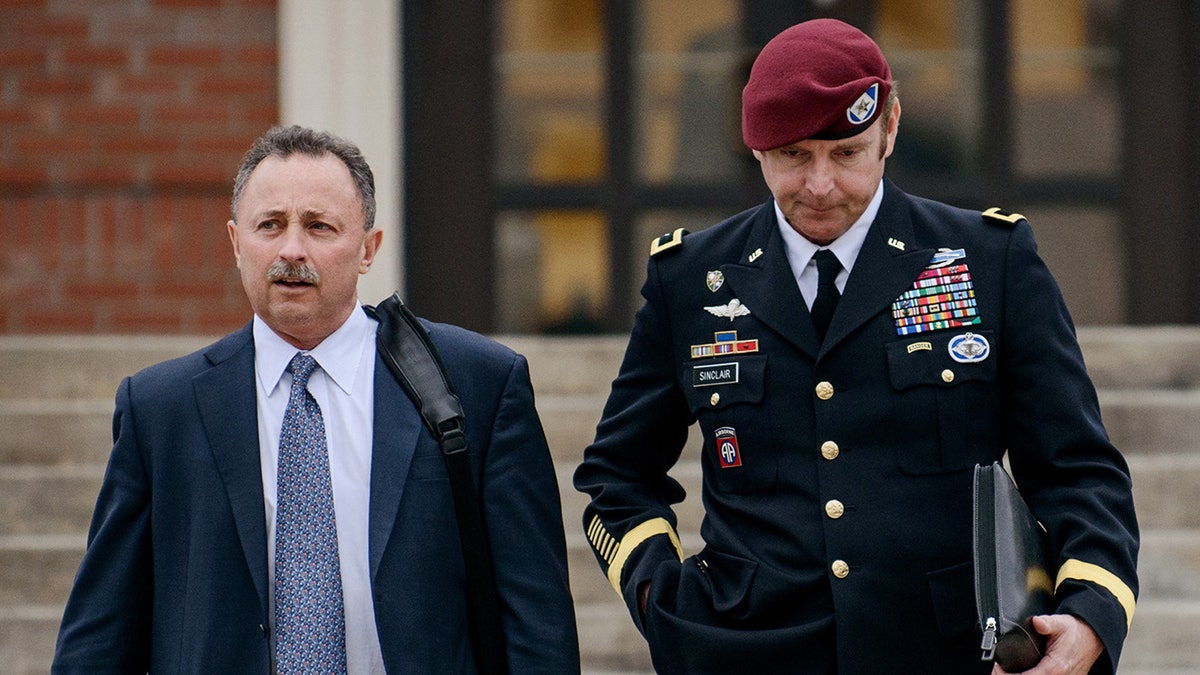
FILE - In this March 4, 2014, file photo, Brig. Gen. Jeffrey Sinclair, right, leaves the courthouse with his lawyers Richard Scheff, left, and Ellen C. Brotman, not pictured, following a day of motions at Fort Bragg, N.C. A military judge declined Monday, March 10, 2014, to dismiss sexual assault charges against Sinclair after reviewing what he said was evidence that political considerations influenced the military's handling of the case. (AP Photo/The Fayetteville Observer, James Robinson, File)
FORT BRAGG, N.C. (AP) – Attorneys for an Army general charged with sexual assault said Tuesday that they have decided to try to renegotiate a plea bargain with a new set of military officials after the judge determined that the case may have been improperly influenced by political concerns.
Judge Col. James Pohl sent the jury of generals back to their duty stations around the world after the defense's decision.
Pohl had declined to dismiss the charges outright on Monday. But he reviewed newly disclosed emails in Sinclair's case and said he found the appearance of "unlawful command influence" in Fort Bragg officials' decision to reject a plea bargain with the general in January.
The twist came with the Pentagon under heavy pressure from Congress and beyond to combat rape and other sex crimes in the military. On Monday, the Senate approved legislation cracking down on misconduct.
Under the military code of justice, the decision was supposed to be decided solely on the evidence, not its broader political implications.
But Pohl said the emails showed that the military officials who rejected the plea bargain had discussed a letter from the accuser's lawyer. The letter warned that allowing the general to avoid trial would "send the wrong signal."
Sinclair, the 51-year-old former deputy commander of the 82nd Airborne Division, is accused of twice forcing a female captain to perform oral sex on him in Afghanistan in 2011 during a three-year extramarital affair. He has admitted to the affair but denied assaulting the woman.
He is believed to be the highest-ranking U.S. military officer ever court-martialed on sexual assault charges. He could get life in prison if convicted.
The defense has portrayed the woman as a liar who concocted the allegations after she saw emails between Sinclair and another woman.
Scheff said the new developments vindicated what the defense has been claiming for months — that the Army pressed ahead with a weak case for fear of the political blowback that would result from dropping charges against such a high-profile defendant.
Lt. Col. Robert Stelle, the lead prosecutor, declined to comment after Monday's hearing.
In December, Sinclair had offered to plead guilty to some of the lesser charges in exchange for the Army dropping the sexual assault charges, but he was turned down.
Sinclair's plea offer was discussed in emails among a high-ranking Washington-based Army lawyer, the prosecutors and the commanding general overseeing the case.
The judge said he doesn't think the whole case was tainted, just the decision on a plea agreement. The judge also criticized prosecutors for not giving defense lawyers the emails sooner: "The only reason we are in this conundrum is because of the government's late notice."
Last week, Sinclair pleaded guilty to three lesser charges involving adultery with the captain and improper relationships with two other female Army officers. Those charges could bring 15 years in prison. A trial then began on the remaining sexual assault charges.
Now, the defense could ask to withdraw Sinclair's guilty plea.
In December, Sinclair's accuser came out against a plea bargain on the sexual assault charges in a letter sent by her attorney, Capt. Cassie L. Fowler. Fowler suggested that the proposal deal would "have an adverse effect on my client and the Army's fight against sexual assault."
"Acceptance of this plea would send the wrong signal to those senior commanders who would prey on their subordinates by using their rank and position, thereby ensuring there will be other victims like my client in the future," Fowler wrote.
Though prosecutors deny any consideration was given to Fowler's comments about the potential fallout, the emails turned over to the defense Saturday show they did discuss her assertions. One top military lawyer at Fort Bragg quoted her letter and said he found Fowler "very preachy."
It was Lt. Gen. James Anderson, as commander of Fort Bragg, who made the final decision on whether to accept Sinclair's plea offer.
Testifying from Afghanistan by telephone, Anderson said Monday that he didn't thoroughly read Fowler's letter. The only thing he weighed in rejecting the deal was that the accuser wanted her day in court, he said.
But Anderson's testimony appeared to be contradicted by a Dec. 20 email he sent to a military lawyer. "I have read the letter and made my decision," Anderson wrote.
Fowler said Monday that the courtroom maneuvering over her letter was "nothing more than an attempt to take the focus off the general's gross misconduct."
Follow us on twitter.com/foxnewslatino
Like us at facebook.com/foxnewslatino
